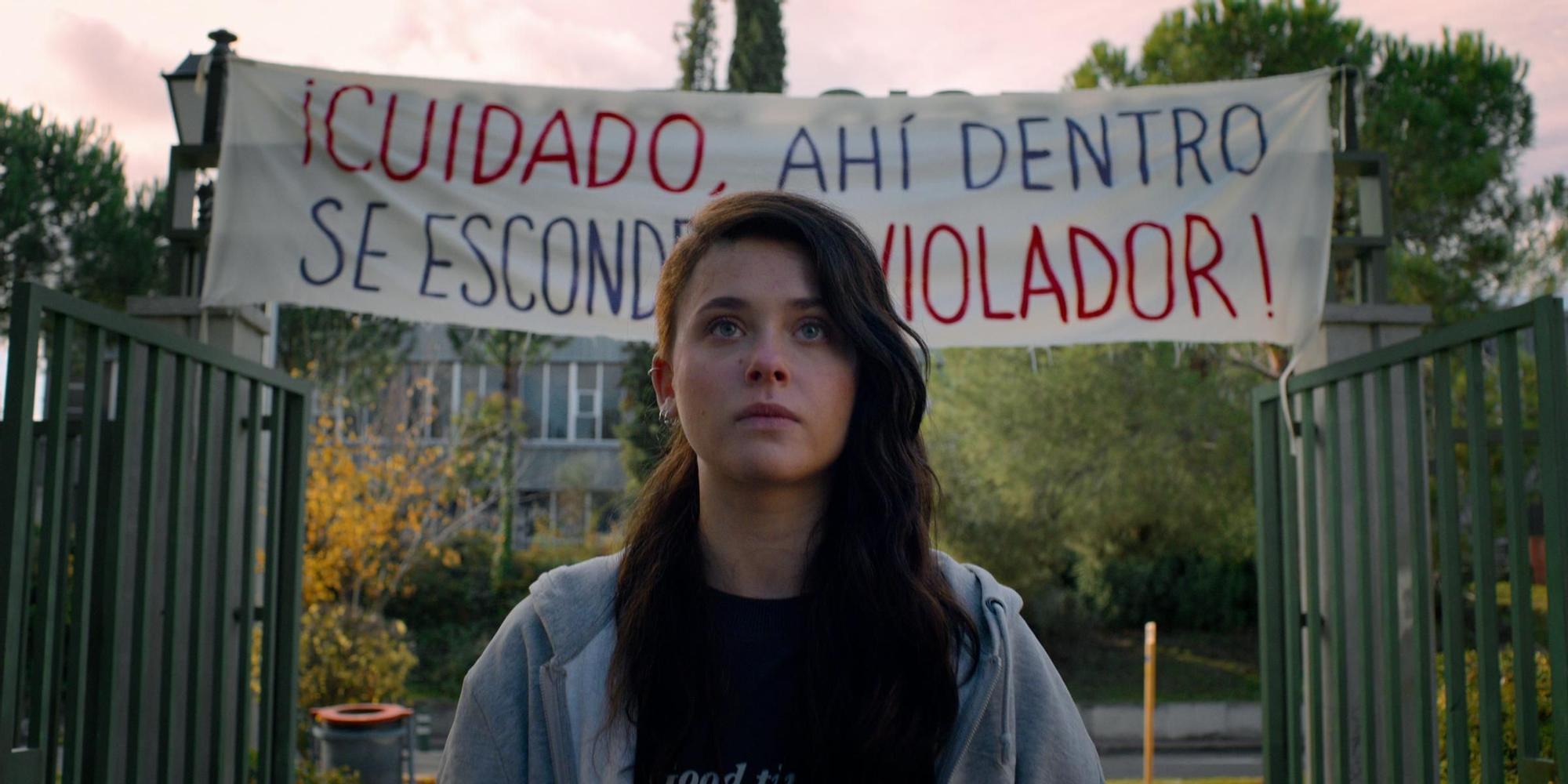In ‘Raising Voices’ on Netflix, directors Eduard Cortés, David Ulloa, and Marta Font bring to life a gripping tale of teenage turmoil. Starring Nicole Wallace, Clara Galle, Teresa de Mera, and Aïcha Villaverde, the Spanish teen drama miniseries follows 17-year-old Alma and her friends Greta and Nata, whose lives are shattered when Alma exposes an assailant lurking in their high school. As Alma grapples with the aftermath, secrets unravel, and allegiances are tested, revealing the complexities of teenage relationships and the quest for justice. With each episode, viewers are drawn deeper into a web of deception and betrayal, questioning the truth behind a disturbing online accusation that threatens to tear their world apart.
The raw emotions depicted by the characters, the intricacies of the plot, and the haunting portrayal of societal issues leave us questioning whether the series is based on true events. From the authentic portrayal of teenage struggles to the unsettling parallels with contemporary issues of sexual assault and social media activism, every aspect of the show feels uncomfortably familiar. The seamless integration of these elements into the storyline sparks curiosity and speculation, compelling viewers to ponder the origins of the narrative and the possibility of real-life inspiration behind the drama.
Raising Voices Finds Its Roots in Miguel Sáez Carral’s Novel
‘Raising Voices’ is based on the novel by Miguel Sáez Carral, who, along with Isa Sánchez, adapted it for the screen. Sáez Carral, a distinguished Spanish journalist and screenwriter, graduated in Journalism from the Complutense University of Madrid. He launched his screenwriting career with ‘Al Salir de Clase,’ earning the Ondas Award for best television series. He also adapted the Colombian novel ‘Sin tetas no hay cielo’ for Spanish television. As the creator and head writer of ‘Homicidios,’ Sáez Carral continued to make his mark, later bringing the novel ‘Apaches’ to life on Netflix. His recent TV works include ‘La caza,’ ‘Sequía,’ and ‘Past Lies,’ showcasing his continued impact on Spanish television.

His creation ‘Raising Voices’ may feel eerily close to reality despite being a fictional narrative since its portrayal of rape culture and the struggles faced by its characters reflects the grim realities of our society. Through its themes and relatable elements, the series serves as a stark reminder of the harsh truths that many endure in silence. Rape culture in schools is a significant real-world issue faced by women. In Kuala Lumpur, Malaysia, 17-year-old Ain Husniza Saiful Nizam used TikTok to expose a teacher’s disturbing joke, igniting an outcry over the violence faced by Malaysian girls and women. This mirrors Alma’s actions in ‘Raising Voices,’ where she hangs a banner at her school to highlight a hidden sexual assault.
Ain, a student at a secondary school in Puncak Alam, revealed that during a class discussion on laws protecting minors from sexual abuse, a male teacher remarked, “If you want to rape someone, make sure they are above 18.” Shocked and disgusted, Ain noted how the girls were silent while the boys laughed. Her video, viewed over 1.8 million times, sparked renewed debate on misogyny and violence, leading Ain to launch the #MakeSchoolASaferPlace campaign despite facing social media backlash and threats of expulsion. This incident underscores the profound impact and power of social media in raising awareness and driving social change.
Institutions frequently endeavor to sweep cases akin to those portrayed in ‘Raising Voices’ or the real-life Steubenville High School assault incident under the rug. Yet, the omnipresence of social media in contemporary society has rendered it progressively challenging to bury such atrocities. The Steubenville High School assault in 2012 shed light on the detrimental effects of social media when used to perpetrate and perpetuate harm. As the rape victim was incapacitated by alcohol, her peers recorded and shared footage of the sexual assault on various platforms like Facebook, Twitter, and through text messages, amplifying the callousness of the assailants.
The widespread dissemination of these recordings not only intensified the victim’s trauma but also fueled a disturbing culture of victim-blaming and ridicule online. The superintendent of schools in Steubenville also faced charges for impeding the investigation into a prior rape that occurred in 2012. In contrast, the #MakeSchoolASaferPlace campaign initiated by Ain Husniza Saiful Nizam in Kuala Lumpur stands as a testament to the constructive power of social media. These parallel examples illustrate the dual nature of social media, which, depending on its application, can either perpetuate harm or foster meaningful societal reform.
‘Raising Voices’ may be rooted in fiction, but its themes resonate deeply with reality, much like other Spanish dramas that tackle similar issues. In ‘Alba,’ a Netflix Spanish show, the protagonist wakes up on a beach, bearing signs of assault but with no memory of the event, only to discover her attackers are her boyfriend’s friends. Similarly, the 2023 Spanish thriller ‘The Snow Girl,’ based on Javier Castillo’s novel, follows journalist Miren Rojo’s relentless pursuit of the truth behind a young girl’s kidnapping while she grapples with her own traumatic sexual assault experience. These narratives, including ‘Raising Voices,’ highlight the pervasive and haunting impact of sexual violence, blurring the line between fiction and real-life horrors.
Even in its fictional narrative, ‘Raising Voices’ deftly intertwines elements of reality, which begs the question of its authenticity. Its poignant portrayal of societal issues, reminiscent of real-world incidents, evokes a sense of familiarity and reflection. Thus, while the series is a work of fiction, its resonance with contemporary challenges prompts a deeper exploration of the pressing issues it confronts. Instances of rape culture and the struggles of young individuals depicted in the series are all too common in our world. However, it is heartening to see that the youth of today are not afraid to speak up against injustice and demand change, as exemplified by Alma’s character in ‘Raising Voices’ or campaigns like #MakeSchoolASaferPlace. This courage to confront and challenge the status quo signals a hopeful shift toward a more accountable and equitable future.
Read More: Most Disturbing Movies on Netflix


You must be logged in to post a comment.